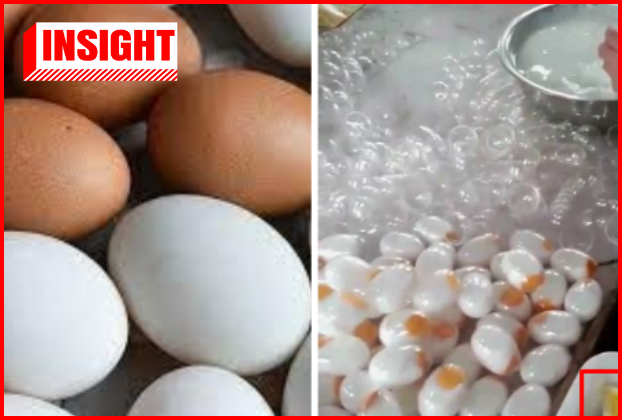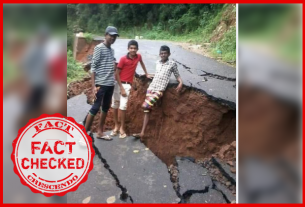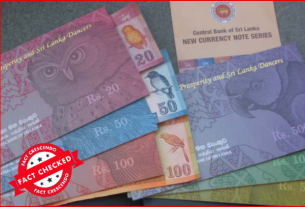Sri Lanka was facing a shortage of eggs in the local market a few months ago, and to address the situation and to control the increasing egg prices, the SL government decided to import eggs from India. However, several concerns have been raised, questioning the quality of these imported eggs.
In such a background, a new fear of using these eggs is spreading in society, claims of plastic eggs! We decided to do a fact-check and explain the facts behind such claims with the comments made by the authorized parties and committees.
Social Media
A viral video among social media users in Sri Lanka shows a manufacturing line that claims to produce eggs artificially. This video is shared with the caption, “Watch this before eating eggs imported from India!”.
Fact Check
Performing a reverse image search on the keyframes of the viral video claiming to be a plastic egg manufacturing process in India, we found that the footage, in fact, had no relation to India.
The video shows a toy egg manufacturing process in China. This was confirmed in a report published in 2017 on the official website of the Jiangning branch of the Municipal Public Security Bureau, China.

It was mentioned that these are not fake eggs entering the market pretending to be real eggs, but they are “toy eggs” for kids. Furthermore, they point out that these toy eggs are available on Chinese e-market platforms.
Also, if we look at the video carefully, stickers with the name of the production brand can be found on those eggs.

With further searches on the products that use the stickers above, we could find toy eggs with the same brand name and sticker in the online market. According to the description on that website, they are toy eggs made for kids. It has the texture of a sponge and was designed to be squeezed by hand to release the tension.
Footage from Benthara & Ja Ela claiming to be plastic eggs!
We also noticed a video spreading on social media saying that egg rolls were sold from a Benthara restaurant containing plastic eggs! In that video, a piece of the egg from the snack was burnt using a lighter, and it turned into ash with a pop sound. Watch the video below.
Also, another video was published on social media, which said that the purported egg is made with plastic and its membrane is made with a thin plastic layer and captured in the Ja-Ela area.
Egg Samples related to the incidents reported from Sri Lanka have been sent for laboratory tests. So far, it has not been revealed that plastic eggs were used in the production!
We contacted the Public Health Inspector of the Benthara area for more reliable information about the second video. He said that the egg part found from the snack at that restaurant had been sent to the laboratory for tests.
We also contacted the Public Health Inspector of the Ja-Ela area for the other video. But he confirmed that there are still no complaints about plastic eggs.
A former Public Health Inspector in that area said that if the eggs could be made out of plastics and other materials, they would be quite costly; hence, it’s not commercially viable to compete with the price of a natural egg. He also pointed out that this could be just an attempt to create haphazard blame on imported eggs to create societal fear and aim to stop importing eggs.
Food Control Administration Unit, Ministry of Health
Dr. Thilak Siriwardena, Director of the Food Control Administration Unit, explained to us that the samples of eggs imported from Sri Lanka are sent to the laboratory for testing, and there haven’t been reports of any instances such as plastic eggs. Also, Dr. Tilak said that after boiling an ordinary egg, it emits a sound, as shown in the video circulating on social media.
We also tried to test this method shown in the viral video and boiled a fresh egg in the market and burnt the egg white part; it made a pop-burning sound similar to that of the viral clip.
The director of the Food Control Administration Unit, MOH, also mentioned that conditions such as the one seen in the video can be seen even after the eggs have been kept in a freezer for a long time. However, these suspected egg parts are advised for further investigation by the analyst.
Institute of Industrial Technology
Additional Director General Professor Ilmi Hewajulige said that there are abilities and facilities to conduct laboratory tests on described suspected eggs with them, but they have not done so. So, she said she cannot comment on this incident.
However, Professor Ilmi said that the production of plastic eggs for human consumption is unheard of. However, she commented that countries like China produce artificial eggs using different chemicals.
Professor Ilmi Hewajulige said that eggs should not be frozen because they can damage the proteins. After freezing, the egg proteins change, and some physical changes can be seen. The situation in the second video may result from such a process. However, she added that the sample needs to be tested in the laboratory for conclusive evidence.
Commenting on the third video, Professor Ilmi said that, sometimes, there is a possibility to grow thicker membranes in chicken eggs. So, for this also, a properly conducted laboratory test would be required.
Consumer Affairs Authority
We contacted Dr. Asela Bandara, Director of Consumer Affairs and Information of the Consumer Affairs Authority. We asked whether there had been any complaints from consumers about the presence of plastic eggs.
And Mr. Asela Bandara said they haven’t received such complaints so far. He also reminded us that similar misleading facts about plastic rice were spread through the community, and no plastic rice could be found in the market. So, he said this could be the same kind of myth created to instill fear among the public.
The Sri Lanka Livestock Producers Association
while commenting to Neth News, the president of the Sri Lanka Livestock Producers Association, Mr. Ajith Gunasekara, said that, even though information on plastic eggs was spread through social media, responsible parties and establishments should verify this by conducting proper testing. Here is the report on that.
Food Safety and Standards Authority of India (FSSAI)
According to a report published by the Food Safety and Standards Authority of India (FSSAI) in 2018, the claim of producing plastic eggs is false. FSSAI says that producing eggs using plastic is a process that incurs higher costs than real chicken eggs.
Also, they point out that as a result of the loss of water in the egg, the white and yolk of the egg shrink in size, and the two may fuse together. So, in such a case, when the egg is broken, it does not separate the yolk or the white like normal eggs. They further note that as the egg loses moisture, it becomes dry and looks like paper, giving the impression of plastic eggs. fssai.gov.in

A similar incident was reported in 2020 from Vavuniya.
However, a similar incident to this was reported from Vavuniya in 2020. Back then, we did a fact-check on that. Here is the fact-check article.
Then, a person who introduced himself as a journalist complained about a snack shop in Vavuniya using artificial eggs in their snacks. Public Health Inspectors in that area investigated these claims, which turned out to be a false alarm.
The eggs were real; no plastic or artificial eggs were found in Vavuniya. The eggs used were deep-frozen after boiling. As a result, they showed a more complex texture.
Also Read: කෘත්රිම ප්ලාස්ටික් බිත්තර යොදා වවුනියාවේ හෝටලයක් ආහාර පිළියෙල කර නැහැ!
Also Read: ප්ලාස්ටික් මිශ්ර සහල් හදන වීඩියෝවක්ද?
Facebook | Twitter | Instagram | Google News | TikTok

Title:Clarification on Misleading and Unverified Video Claims of Plastic Eggs in Sri Lankan Market!
Written By: Fact Crescendo TeamResult: Insight






